Comprehensive Guide to Garden Maintenance in Purley
Introduction to Garden Maintenance
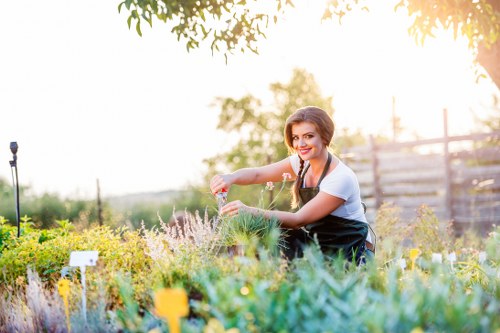
Maintaining a beautiful garden in Purley requires dedication, knowledge, and the right approach. Whether you have a small backyard or an expansive outdoor space, proper garden maintenance ensures your plants thrive and your garden remains an inviting sanctuary.
In Purley, the climate and local conditions play a significant role in how gardens grow. Understanding these factors can help you tailor your maintenance practices to suit your specific environment.
Regular maintenance not only enhances the aesthetic appeal of your garden but also promotes the health and longevity of your plants. This article delves into the essential aspects of garden maintenance in Purley, providing you with actionable tips and strategies.
Understanding Purley's Climate
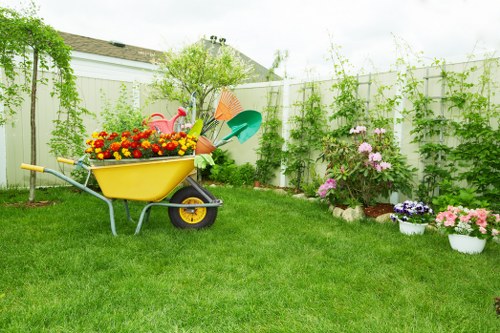
Purley enjoys a temperate climate with mild summers and cool winters. This climate is conducive to a wide variety of plants, but it also presents unique challenges that gardeners must navigate.
The region receives ample rainfall throughout the year, which can be both a boon and a bane. While it ensures that plants receive necessary hydration, excessive moisture can lead to issues like fungal diseases and root rot.
Additionally, the variation in temperature between seasons requires gardeners to be proactive in their maintenance routines, ensuring that plants are protected during adverse weather conditions.
Essential Garden Maintenance Tasks
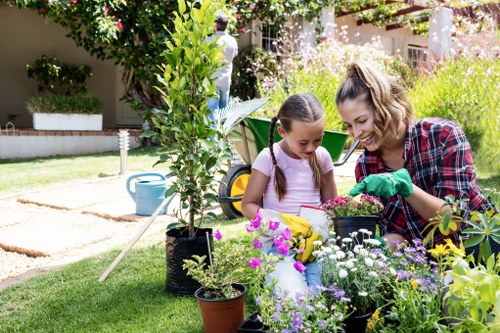
Maintaining a garden involves a series of regular tasks that keep your outdoor space healthy and vibrant. Here are some of the essential garden maintenance activities you should incorporate:
- Weeding: Regularly removing weeds prevents them from competing with your plants for nutrients and water.
- Pruning: Trimming branches and stems promotes healthy growth and enhances the shape of your plants.
- Watering: Ensuring that plants receive the right amount of water is crucial, especially during dry spells.
- Fertilizing: Providing essential nutrients helps plants grow stronger and more resilient.
- Pest Control: Identifying and managing pests early prevents them from causing significant damage.
Incorporating these tasks into your weekly routine can significantly improve the health and appearance of your garden.
Proper scheduling and organization of these tasks ensure that no aspect of garden maintenance is overlooked.
Seasonal Maintenance Tips
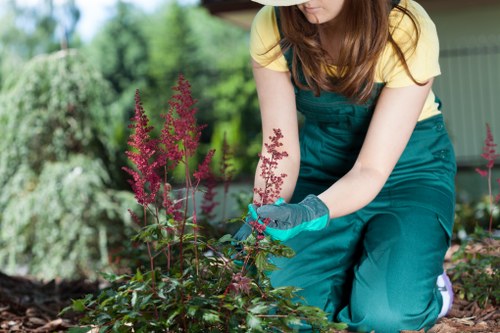
Each season brings its own set of challenges and opportunities for garden maintenance. Adapting your maintenance practices to the changing seasons can lead to a more robust and beautiful garden.
- Spring: Focus on planting new flowers, pruning shrubs, and preparing the soil for the growing season.
- Summer: Emphasize watering, pest control, and deadheading to encourage continuous blooming.
- Autumn: Clean up fallen leaves, plant bulbs for next spring, and protect plants from the approaching cold.
- Winter: Plan for the upcoming year, protect sensitive plants, and maintain garden tools.
Understanding the specific needs of your garden during each season ensures that your plants receive the appropriate care at the right time.
Implementing seasonal strategies can also help you manage your time and resources more effectively.
Choosing the Right Plants for Purley Gardens
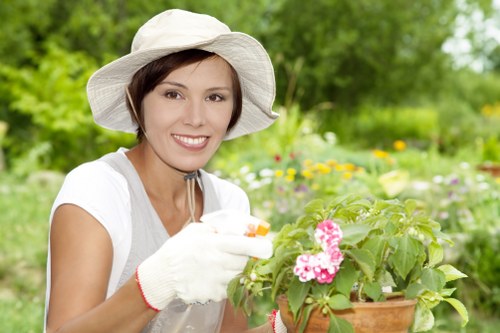
Selecting the appropriate plants is fundamental to successful garden maintenance. In Purley, certain plants are better suited to the local climate and soil conditions.
Consider incorporating a mix of perennials and annuals to ensure year-round interest. Perennials offer enduring beauty, while annuals provide vibrant colors that can be changed seasonally.
Additionally, native plants are a great choice as they are adapted to the local environment and require less maintenance.
- Rhododendrons: Thrive in Purley's climate and add lush greenery.
- Lavender: Offers both aesthetic appeal and attracts beneficial pollinators.
- Hostas: Excellent for shaded areas and provide texture.
- Hydrangeas: Deliver beautiful blooms that last through the summer.
Choosing the right plants not only enhances the beauty of your garden but also reduces the effort required for maintenance.
Consulting with local nurseries can provide additional insights into the best plant varieties for your specific garden.
Soil Health and Preparation
The foundation of a thriving garden is healthy soil. In Purley, understanding your soil type and its nutrient content is essential for successful garden maintenance.
Conducting a soil test helps determine pH levels and nutrient deficiencies. Based on the results, you can amend the soil with the necessary fertilizers and organic matter.
Incorporating compost into your soil not only improves its structure but also enhances its fertility, promoting robust plant growth.
Proper soil preparation before planting ensures that your plants have the best possible environment to establish themselves.
Maintaining soil health over time involves regular addition of organic matter and avoiding practices that deplete nutrients.
Healthy soil supports strong root systems, making plants more resilient to diseases and environmental stresses.
Efficient Irrigation Practices
Understanding Water Needs
Efficient irrigation is pivotal for garden maintenance in Purley. Different plants have varying water requirements, and understanding these needs can prevent overwatering or underwatering.
Establish a watering schedule that aligns with the specific needs of your plants and the local climate conditions. Early morning watering is often recommended to reduce evaporation and allow plants to absorb moisture effectively.
Using drip irrigation systems can provide targeted watering, conserving water and ensuring that plants receive adequate hydration without wastage.
Pest and Disease Management
Identifying Common Pests
Gardens in Purley are susceptible to various pests and diseases that can hinder plant growth. Early identification and management are key to maintaining a healthy garden.
Common pests include aphids, slugs, and caterpillars, which can cause significant damage if left unchecked.
Implementing integrated pest management strategies, such as introducing natural predators and using eco-friendly pesticides, can effectively control pest populations.
Preventative Measures
Prevention is better than cure when it comes to garden pests and diseases. Regular inspection of plants, maintaining good garden hygiene, and selecting disease-resistant plant varieties are crucial preventative measures.
Ensuring proper spacing between plants promotes air circulation, reducing the likelihood of fungal infections.
Removing diseased plant parts promptly prevents the spread of infections to healthy plants.
Mulching for Garden Health
Mulching is a valuable practice in garden maintenance that offers multiple benefits. It helps retain soil moisture, suppresses weeds, and regulates soil temperature, creating a more favorable environment for plant growth.
Organic mulches, such as bark, straw, and compost, add nutrients to the soil as they decompose, further enhancing soil health.
Applying mulch around plants can also improve the garden's appearance, giving it a neat and well-maintained look.
- Benefits of Mulching:
- Water conservation
- Weed suppression
- Soil temperature regulation
- Enhanced soil fertility
- Types of Mulch:
- Organic Mulch (bark, straw, compost)
- Inorganic Mulch (gravel, rubber)
Choosing the right type of mulch depends on your garden's specific needs and aesthetic preferences.
Regular replenishment of mulch ensures that its benefits are sustained throughout the year.
Pruning and Trimming Techniques
Why Pruning is Important
Pruning is essential for maintaining the shape, health, and productivity of your plants. Proper pruning techniques can prevent diseases, enhance fruit production, and promote vigorous growth.
Regular trimming also improves the appearance of your garden, giving it a structured and well-groomed look.
Understanding the specific pruning needs of different plant species is crucial for effective maintenance.
Pruning Tips
When pruning, use clean and sharp tools to make precise cuts that minimize damage to the plant.
Remove any dead, diseased, or damaged branches first, followed by crossing or overly thick branches to improve air circulation.
For flowering plants, pruning after the blooming period ensures that you do not remove buds that will produce flowers.
Lawn Care and Maintenance
A lush, green lawn is a cornerstone of any beautiful garden. Proper lawn care involves mowing, fertilizing, aerating, and controlling weeds and pests.
Regular mowing encourages even growth and prevents the grass from becoming too long, reducing the risk of diseases.
Fertilizing your lawn in the spring and fall provides essential nutrients that promote healthy growth and resilience.
Aerating the lawn in the growing season improves soil structure, allowing roots to access oxygen and nutrients more effectively.
Implementing preventive measures against weeds and pests ensures that your lawn remains healthy and vibrant throughout the year.
Using appropriate lawn care products and techniques tailored to Purley's climate can yield the best results.
Hardscape Maintenance
Hardscape elements, such as pathways, patios, and fences, complement the soft elements of your garden. Proper maintenance of these structures ensures functionality and aesthetic appeal.
Regular cleaning and repairs prevent deterioration caused by weather conditions and regular use.
Sealing and staining wooden structures preserve their appearance and extend their lifespan.
Keeping hardscape areas free from debris and ensuring proper drainage prevent water damage and other issues.
Incorporating hardscape maintenance into your garden routine enhances the overall beauty and usability of your outdoor space.
A well-maintained hardscape provides a stable foundation for your garden activities and brings cohesion to your garden design.
Seasonal Planting Schedules
Adhering to a seasonal planting schedule ensures that your garden remains vibrant and healthy throughout the year. Strategic planting timing aligns with the climate patterns in Purley, optimizing plant growth and bloom periods.
Spring is ideal for planting perennials, shrubs, and trees, giving them ample time to establish before the growing season.
Summer planting focuses on heat-tolerant annuals and vegetables, ensuring they thrive during the warmer months.
Autumn planting includes bulbs and perennials that will bloom in the coming spring, providing early beauty to your garden.
Understanding the best planting times for different species enhances your garden's productivity and visual appeal.
Plan your garden layout and plant selection according to these seasonal schedules for optimal results.
Organic Gardening Practices
Embracing organic gardening practices in Purley promotes a healthy ecosystem and reduces reliance on chemical fertilizers and pesticides.
Using compost and natural fertilizers enriches the soil without introducing harmful substances.
Implementing companion planting attracts beneficial insects that control pest populations naturally.
Natural pest control methods, such as neem oil or insecticidal soaps, manage pests without damaging the environment.
Organic mulching supports soil health and provides a sustainable approach to garden maintenance.
Adopting these practices contributes to a sustainable and environmentally friendly garden.
Tools and Equipment for Effective Maintenance
Having the right tools and equipment is essential for efficient garden maintenance in Purley. Investing in quality tools ensures longevity and effectiveness, making your maintenance tasks easier and more enjoyable.
- Pruning Shears: For precise trimming of branches and stems.
- Lawn Mower: Keeps your lawn neat and even.
- Garden Fork: Essential for soil aeration and turning.
- Watering System: Drip irrigation or sprinklers for efficient watering.
- Weeder: Helps in the removal of unwanted weeds.
Regular maintenance and cleaning of your tools extend their lifespan and ensure they perform optimally.
Proper storage protects your tools from damage and keeps your garden organized.
Creating a Maintenance Schedule
A structured maintenance schedule keeps your garden tasks organized and ensures that no aspect of garden care is neglected.
Divide your maintenance tasks into daily, weekly, monthly, and seasonal activities to manage your time effectively.
Utilize garden planners or digital tools to track your maintenance routines and remind you of upcoming tasks.
Adjust your schedule based on seasonal changes and specific garden needs, maintaining flexibility while staying organized.
Consistent adherence to your maintenance schedule results in a flourishing and well-maintained garden.
Having a clear plan reduces stress and improves the efficiency of your garden care efforts.
Sustainable Gardening Practices
Sustainable gardening focuses on minimizing environmental impact while maintaining a healthy and productive garden. Implementing sustainable practices in your garden in Purley ensures long-term benefits for both your plants and the environment.
Key sustainable practices include:
- Rainwater Harvesting: Collecting and utilizing rainwater reduces reliance on municipal water sources.
- Composting: Recycling garden waste into compost enriches the soil naturally.
- Using Native Plants: Native species require less water and are more resistant to local pests and diseases.
- Reducing Chemical Use: Opting for organic fertilizers and pest control methods protects beneficial insects and soil health.
- Energy-Efficient Lighting: Incorporating solar-powered lights reduces energy consumption.
Adopting these practices contributes to a healthier ecosystem and a more resilient garden.
Sustainability in gardening not only benefits the environment but also reduces maintenance efforts and costs over time.
Enhancing Garden Aesthetics
Aesthetic appeal is a significant aspect of garden maintenance. Creating a visually pleasing garden involves thoughtful design, plant selection, and maintenance practices.
Incorporate a variety of plant textures, colors, and heights to add depth and interest to your garden.
Utilize focal points, such as sculptures or water features, to draw attention and create visual balance.
Regularly deadhead flowers and maintain plant shapes to preserve the garden's neat appearance.
Strategic use of lighting highlights garden features and extends your enjoyment of the space into the evening.
Maintaining pathways and hardscape elements ensures that the functionality complements the garden's beauty.
Benefits of Professional Garden Maintenance
While DIY garden maintenance can be fulfilling, hiring professional services offers numerous benefits, especially for larger or more complex gardens in Purley.
Professionals bring expertise and knowledge, ensuring that maintenance tasks are performed efficiently and effectively.
They use specialized tools and equipment, enhancing the quality of maintenance work.
Outsourcing maintenance frees up your time, allowing you to enjoy your garden without the associated labor.
Professional maintenance services can provide customized care plans tailored to your garden's specific needs.
Investing in professional maintenance ensures a consistently beautiful and healthy garden throughout the year.
When to Consider Professional Help
Consider hiring professionals when managing extensive gardens, dealing with persistent pests, or undertaking major landscaping projects.
Seasonal maintenance tasks, such as pruning and soil preparation, can also benefit from professional expertise.
Conclusion
Effective garden maintenance in Purley is a blend of knowledge, planning, and consistent effort. By understanding the local climate, choosing the right plants, and implementing regular maintenance routines, you can cultivate a thriving and beautiful garden.
Whether you opt for DIY maintenance or enlist the help of professionals, prioritizing your garden's care ensures that it remains a delightful and serene space year-round.
Start your garden maintenance journey today and transform your outdoor space into a lush, vibrant haven.
Contact us today to schedule your garden maintenance services and experience the difference a well-maintained garden can make!
